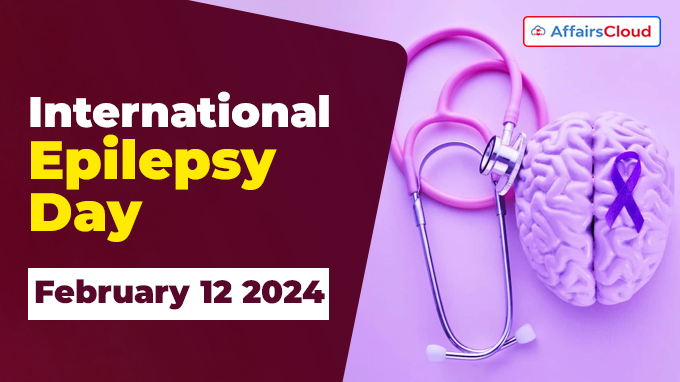 International Epilepsy Day is annually observed across the globe on the 2nd Monday in February to raise awareness about epilepsy, a neurological disorder, its condition, diagnosis, and treatment.
International Epilepsy Day is annually observed across the globe on the 2nd Monday in February to raise awareness about epilepsy, a neurological disorder, its condition, diagnosis, and treatment.
- International Epilepsy Day 2024 is observed on 12 February 2024.
International Epilepsy Day 2023 was observed on 13 February 2023; In 2025, it will be observed on 10 February 2025.
- The 2024 theme of International Epilepsy Day is, “Milestones on My Epilepsy Journey.”
The campaign of International Epilepsy Day 2024 is, “#MyEpilepsyJourney.”
Symbol & Colour of Epilepsy:
Lavender is recognised as the international flower of epilepsy, to symbolise isolation and loneliness, often associated with epilepsy.
- The colour purple is associated with epilepsy awareness.
Significance:
i.The Day is a global platform for individuals with epilepsy to share their stories, fostering understanding and support.
ii.It also aims to eliminate the myths and misconceptions surrounding epilepsy and seizures.
Background:
i.International Epilepsy Day is a joint initiative of the International Bureau for Epilepsy (IBE) and the International League Against Epilepsy (ILAE).
ii.The 1st ever International Epilepsy Day was observed on 9th February 2015(Monday).
iii.Since then, the 2nd Monday of February of every year is observed as International Epilepsy Day.
What is Epilepsy?
i.Epilepsy is a chronic noncommunicable disease (NCD) of the brain impacting approximately 50 million individuals of all ages. It is often called a “seizure disorder.”
ii.This neurological disorder is marked by recurrent seizures, presenting as brief episodes of involuntary movements.
iii.These seizures can manifest as partial, involving specific body parts, or generalised, affecting the entire body.
Key Facts:
i.Around 65 million people around the world live with epilepsy and nearly 80% of the people with epilepsy (PWE) live in developing countries.
- 4 out of 10 PWE in the industrialised world do not receive appropriate treatment;
- 8 out of 10 PWE in developing nations do not receive appropriate treatment.
ii.Epilepsy is one of the world’s oldest recognised conditions, with written records dating back to 4000 BCE.
iii.The Greek philosopher Hippocrates (460-377 BC) was the first person to think that epilepsy starts in the brain.
WHO’s Efforts on Epilepsy:
i.In 2022, the World Health Organisation (WHO) launched the Intersectoral Global Action Plan on Epilepsy and Other Neurological Disorders 2022-31 (IGAP), a 10-year roadmap at the 75th World Health Assembly (WHA) in Geneva, Switzerland.
- IGAP aims to improve access to treatment and care and quality of life of people with neurological disorders.
ii.The first global report on epilepsy titled “Epilepsy: A Public Health Imperative” was produced in 2019 by WHO and key partners.
iii.WHO, ILAE, and IBE led the Global Campaign Against Epilepsy to raise awareness about epilepsy, strengthen public and private efforts to improve care and reduce the disease’s impact.
2024 Events in India:
National Institutes under the Ministry of Social Justice and Empowerment(MoSJE) and Composite Regional Centre (CRC) for Persons with Disabilities(PwDs) organised several events across India to mark the observance of International Epilepsy Day on 12th February 2024.
Note:
i.The National institutes under MoSJE include the National Institutes for the Empowerment of Persons with Intellectual Disabilities (NIEPID) – formerly known as National Institute for the Mentally Handicapped (NIMH), and the National Institute of Mental Health Rehabilitation (NIMHR).
ii.CRCs for PwDs function under the Department of Empowerment of Persons with Disabilities (Divyangjan), MoSJE.
Related observance – Purple Day:
Purple Day is an annual global initiative observed on 26 March to create awareness about epilepsy. The day was created in 2008 by Cassidy Megan(9 year old) from Nova Scotia, Canada motivated by her own struggle with epilepsy.
About International League Against Epilepsy (ILAE):
President– J. Helen Cross
Headquarters– Dundrum, Ireland
Founded in– 1909




